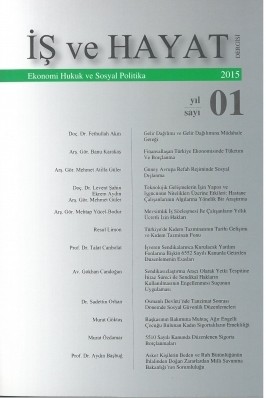Sendikal İçi Demokrasinin Sağlanmasında 6356 Sayılı Sendikalar ve Toplu İş Sözleşmesi Kanunu
Çağımızda üye sayıları yüzbinleri bulan sendikaların işleyişi oldukça karma- şıklaşmıştır. Üye sayısının artması sendika yönetiminde uzmanlaşmayı, bü- rokratikleşmeyi ve oligarşik eğilimleri ortaya çıkarırken, sendika yönetimi ile üyeler arasındaki bağları da zayıflatmıştır. Böylece, sendika içi demokrasi sorunu doğmuştur. Demokratik ülkelerde, sendikaların işleyişlerinin demokratik ilkelere uygun olması esastır. Bu uygunluğun sağlanması için çeşitli hukuki düzenlemelere yer verilmektedir. 1982 Anayasasında (m.51), sendikaların iç işleyişi ve faaliyetlerinin demokratik esaslara uygun olması, sendikalar hukukunun önemli bir ilkesi olarak kabul edilmiştir. Bu ilke ile üyelik başlangıcından itibaren sendikanın tüm faaliyetlerinin ve kararlarının demokratik ilkelere uygun olması amaçlanmaktadır. Bu çalışmada, Anayasada (m.51) yer verilen sendikanın yapısının ve işleyişinin demokrasiye uygunluğunun sağlanması açısından 18.10.2012 tarih ve 6356 sayılı Sendikalar ve Toplu İş Sözleşmesi Kanununda yer verilen düzenlemeler ele alınmaktadır.
Anahtar Kelimeler:
“Demokrasi”, “sendika içi demokrasi”, “sendika yönetim ve işleyişi”, “sendika tüzüğü”, “6356 sayılı Sendikalar ve Toplu İş Sözleşmesi Kanunu”
THE IMPACT OF THE ACT ON TRADE UNIONS AND COLLECTIVE LABOUR AGREEMENTS NO 6356 ON THE REALIZATION OF DEMOCRACY WITHIN TRADE UNIONS
Contemporary trade unions are composed of several hundred thousand membres, and this fact is tough to manage for trade unions. Increasing number of members has created more specialization, bureaucratization and oligarchical attitudes within trade unions whereas the ties between trade unions and their members have weakened. Thus, the problem of democracy within trade unions was born. It is essential to a democratic state that the functioning of trade unions should obey democratic principles. Democratic countries have set various legal regulations for this purpose. 1982 Constitution states in Article 51 that the inner regulations and functioning of trade unions should be consistent with the principles of democracy. Fundamental to the law of trade unions, this principle repuires that in all stages such as accession to membership, functioning and decision-making, trade unions should obey democratic principles. This essay analyses the dispositions of the Act on Trade Unions and Collective Labour Agreements No 6356 with regard to the principles set in the Article 51 of the 1982 Constitution which emphasises the consistency of trade unions with democratic principles both in their inner structuring and functioning.
Keywords:
“Democracy”, “democracy within trade unions”, “administration of trade unions and their functioning”, “statute of a trade union”, “Act on Trade Unions and Collective Labour Agreements No 6356”,
- ISSN: 2547-9873
- Başlangıç: 2015
- Yayıncı: Şeker-İş Sendikası
Sayıdaki Diğer Makaleler
Toplu İş Sözleşmesi Yapma Yetkisindeki Temel Sorunlar ve Sendikal Haklara Olumsuz Etkisi
Hamza KANDEMİR, Bayram DİRİK, Müslime NARİN
Türkiye'nin Mülteci Sorunu ve Suriye Krizinin Mülteci Sorununa Etkileri
Ali Kemal NURDOĞAN, Ali İhsan Burak DUR, Mustafa ÖZTÜRK
Çalışma Hayatında Dezavantajlı Bir Grup: Göçmenler
Türk Romanında Emekçilerin Varlığı Üzerine Bir İnceleme
Sendikal İçi Demokrasinin Sağlanmasında 6356 Sayılı Sendikalar ve Toplu İş Sözleşmesi Kanunu
